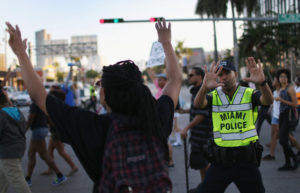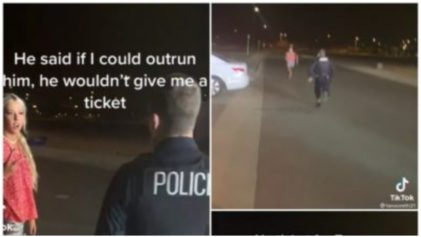
A City of Miami police officer stops traffic as demonstrators march through the Wynwood neighborhood to protest police abuse on Dec. 7, 2014 in Miami, Florida. (Joe Raedle/Getty Images)
A new American Civil Liberties Union report shows that Florida police are targeting Black drivers. According to the ACLU, police ticket Black people for seat belt violations at twice the rate of white drivers. The data came from police agencies enforcing the Florida Safety Belt Law.
However, the ACLU report found some cities had even worse racial disparities in seat belt enforcement.
- In 2011, the Escambia County Sheriff’s Office handed out seat belt violation tickets to Black drivers at four times the rate of white drivers.
- Black drivers were three times as likely to be ticketed as white drivers by the Palm Beach County Sheriff’s Office in 2014.
- The Orange County Sheriff’s Office ticketed Black drivers at 2.8 times the rate of white drivers in 2014.
According to The New York Times, the ACLU also found that Black drivers received 22 percent of seat belt tickets, even though they make up only 13.5 percent of the driving population. Florida police have been accused of racial profiling in the past.
“In 2013 and 2014, media disclosed shocking reports that the Miami Gardens Police Department conducted thousands of illegal stops, frisks, searches, and arrests between 2008 and 2013 under a racially motivated quota system that directed officers to target Black men between the ages of fifteen and thirty,” according to the ACLU report. “Those reports led to a civil rights lawsuit in federal court and disclosed that Miami Gardens police officers had even subjected Black children to police civilian encounters.”
A 2005 state law required police agencies to track data on traffic stops. However, the ACLU said some police departments are not complying with the law. The report stated that the Miami and Tampa police departments were not providing data. The ACLU has requested the Florida legislature penalize law enforcement agencies that refuse to provide traffic stop data.
“We cannot have a law that requires the reporting of the race of ticket recipients and has no consequences for the agencies that fail to comply,” said Howard Simon, executive director of the ACLU of Florida.
Nusrat Choudhury, a lawyer with the ACLU’s racial justice program and an author of the report, said excessive traffic stops are more than a nuisance for Black drivers. They can breed resentment, and as shown in the Sandra Bland case, a traffic stop can escalate to something even worse.
“Communities feel stigmatized not because of what they have done but who they are. And it burdens people with fines that can be hard to pay,” Choudhury told The New York Times.
The ACLU is calling on the Florida attorney general’s office to investigate the issue and has urged police departments to review their training policies.


